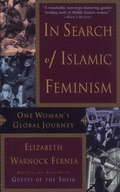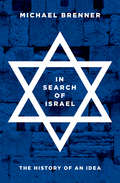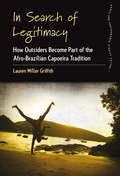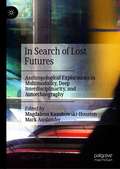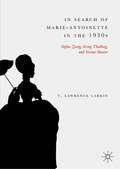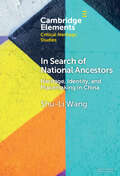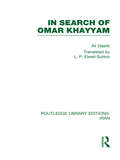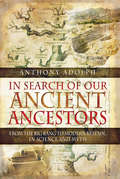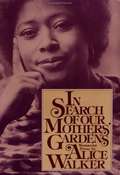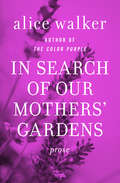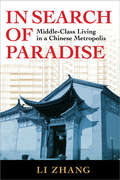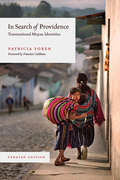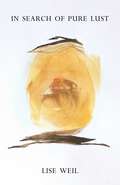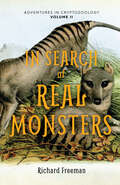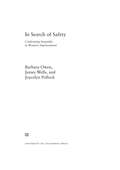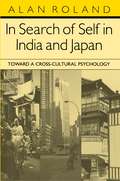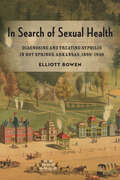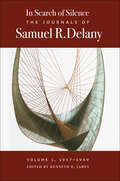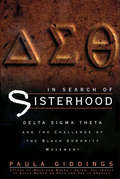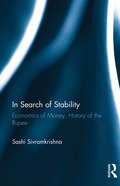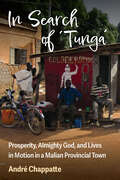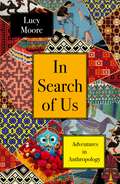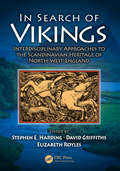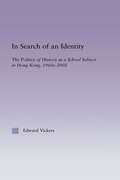- Table View
- List View
In Search of Islamic Feminism
by Elizabeth Warnock Fernea"Islamic feminism" would seem a contradiction in terms to most Westerners. We are taught to think of Islam as a culture wherein social code and religious law alike force women to accept male authority and surrender to the veil. How could feminism emerge under such a code, let alone flourish? Now, traveling throughout Central Asia, Africa, and the Middle East, as well as Islamic communities in the United States, acclaimed Arab Studies scholar and bestselling author Elizabeth Fernea sets out to answer that question.Fernea's dialogue with friends, colleagues, and acquaintances prompts a range of diverse and unpredictable responses, but in every country she visits, women demonstrate they are anything but passive. In Iraq, we see an 85 percent literacy rate among women; in Egypt, we see women owning their own farms; and in Israel, we see women at the very forefront of peacemaking efforts. Poor or rich, educated or illiterate, these women define their own needs, solve their own problems, and determine the boundaries of their own very real, very viable feminism. In Search of Islamic Feminism offers a groundbreaking new interpretation of the status and vision of Muslim women that will open up a new world to its readers, even as it challenges our own sense of what feminism means.From the Trade Paperback edition.
In Search of Israel: The History of an Idea
by Michael BrennerA major new history of the century-long debate over what a Jewish state should beMany Zionists who advocated the creation of a Jewish state envisioned a nation like any other. Yet for Israel's founders, the state that emerged against all odds in 1948 was anything but ordinary. Born from the ashes of genocide and a long history of suffering, Israel was conceived to be unique, a model society and the heart of a prosperous new Middle East. It is this paradox, says historian Michael Brenner--the Jewish people's wish for a homeland both normal and exceptional—that shapes Israel's ongoing struggle to define itself and secure a place among nations. In Search of Israel is a major new history of this struggle from the late nineteenth century to our time.When Theodor Herzl convened the First Zionist Congress in 1897, no single solution to the problem of "normalizing" the Jewish people emerged. Herzl proposed a secular-liberal "New Society" that would be home to Jews and non-Jews alike. East European Zionists advocated the renewal of the Hebrew language and the creation of a distinct Jewish culture. Socialists imagined a society of workers' collectives and farm settlements. The Orthodox dreamt of a society based on the laws of Jewish scripture. The stage was set for a clash of Zionist dreams and Israeli realities that continues today.Seventy years after its founding, Israel has achieved much, but for a state widely viewed as either a paragon or a pariah, Brenner argues, the goal of becoming a state like any other remains elusive. If the Jews were the archetypal "other" in history, ironically, Israel—which so much wanted to avoid the stamp of otherness—has become the Jew among the nations.
In Search of Legitimacy: How Outsiders Become Part of the Afro-Brazilian Capoeira Tradition (Dance and Performance Studies #7)
by Lauren Miller GriffithEvery year, countless young adults from affluent, Western nations travel to Brazil to train in capoeira, the dance/martial art form that is one of the most visible strands of the Afro-Brazilian cultural tradition. In Search of Legitimacy explores why "first world" men and women leave behind their jobs, families, and friends to pursue a strenuous training regimen in a historically disparaged and marginalized practice. Using the concept of apprenticeship pilgrimage-studying with a local master at a historical point of origin-the author examines how non-Brazilian capoeiristas learn their art and claim legitimacy while navigating the complexities of wealth disparity, racial discrimination, and cultural appropriation.
In Search of Lost Futures: Anthropological Explorations in Multimodality, Deep Interdisciplinarity, and Autoethnography
by Magdalena Kazubowski-Houston Mark AuslanderIn Search of Lost Futures asks how imaginations might be activated through practices of autoethnography, multimodality, and deep interdisciplinarity—each of which has the power to break down methodological silos, cultivate novel research sensibilities, and inspire researchers to question what is known about ethnographic process, representation, reflexivity, audience, and intervention within and beyond the academy. By blurring the boundaries between the past, present, and future; between absence and presence; between the possible and the impossible; and between fantasy and reality, In Search of Lost Futures pushes the boundaries of ethnographic engagement. It reveals how researchers on the cutting edge of the discipline are studying absence and grief and employing street performance, museum exhibit, anticipation, or simulated reality to research and intervene in the possible, the impossible, and the uncertain.
In Search of Marie-Antoinette in the 1930s: Stefan Zweig, Irving Thalberg, And Norma Shearer
by T. Lawrence LarkinIn Search of Marie-Antoinette in the 1930s follows Austrian biographer Stefan Zweig, American producer Irving Thalberg, and Canadian-American actress Norma Shearer as they attempt to uncover personal aspects of Marie-Antoinette’s life at the French court in the late eighteenth-century and to dramatize them in biography, cinema, and performance for public consumption during the 1930s. The first chapter establishes the core subject as an inquiry into the respective contributions of Zweig, Thalberg, and Shearer in formulating an “objective” or “authentic” image of “Marie-Antoinette.” The three chapters that follow examine in some detail how Zweig pursued research and drafted the psychological biography at his Salzburg home, Thalberg acquired film rights to the best-selling book and fought the censors to preserve the more sensational aspects of the screenplay at the Culver City studio, and Shearer worked closely with a new producer to give the script a strong romantic angle and to perform the character of the queen on the sound stage. The professionals’ research standards and strategic objectives are weighed in the formulation of a new myth at once sensitive to the historical record and suited to the leisure market.
In Search of National Ancestors: Heritage, Identity and Placemaking in China (Elements in Critical Heritage Studies)
by Shu-Li WangThis Element examines how international heritage discourses are internalized and reshaped in China, using the Yellow Emperor cults as a lens to explore broader themes of intangible heritage, religious resurgence, and identity construction. The central argument is that cultural heritage serves as a powerful tool for shaping new religious expressions and enabling Chinese localities to assert their uniqueness while redefining historical narratives. Through case studies of several localities across China, this research illustrates how these regions engage in heritage competition by branding themselves with Yellow Emperor culture to shape their identities. This study argues that the cult of the Yellow Emperor-a legendary figure-is empowered by nationalism, a local search for tradition and religious revivals, and is further amplified by international discourses that reinforce national identity through heritage-making. Together, these forces drive the resurgence of ancestral cults and contribute to cultural identity formation in contemporary China.
In Search of Omar Khayyam (Routledge Library Editions: Iran #No. 1)
by Ali DashtiKhayyam has been the subject of speculation on the part of literary critics ever since Edward Fitzgerald published his own version of the Rubaiyat in 1859. This edition represented the first opportunity to study in English the work of Khayyam by a Persian scholar. There is no conclusive evidence to prove which of the many quatrains attributed to Khayyam are authentic. Ali Dashti therefore constructs a likeness of the poet from references found in the works of writers of his day or immediately after, and from Khayyam’s own works on philosophy, mathematics and astronomy, of which the authenticity is not questioned. Khayyam emerges as a widely read and broad-minded scholar, immersed in his own studies, cautious and moderate, averse to committing himself on controversial questions. Using this portrait Dashti draws up a list of some hundred quatrains which are in keeping with Khayyam’s character. Selling point: An elegant and accurate translation which throws light on the nature of Khayyam’s religious and philosophical beliefs.
In Search of Our Ancient Ancestors: From the Big Bang to Modern Britain, In Science and Myth
by Anthony AdolphA top genealogist &“shows how genetics helps and how it roots each of us in this magnificent story of Life on Earth in the most meaningful way imaginable.&”—Reunite Magazine &“What a fine long pedigree you have given the human race.&”—Charles Darwin to Charles Lyell, 1863 How distantly are we related to dinosaurs? How much of your DNA came from Neanderthals? How are the builders of Stonehenge connected to great-grandpa? According to science, life first appeared on Earth about 3,500 million years ago. Every living thing is descended from that first spark, including all of us. But if we trace a direct line down from those original life forms to ourselves, what do we find? What is the full story of our family tree over the past 3,500 million years, and how are we able to trace ourselves so far back? From single-celled organisms to sea-dwelling vertebrates; amphibians to reptiles; tiny mammals to primitive man; the first Homo sapiens to the cave painters of Ice Age Europe and the first farmers down to the Norman Conquest, this book charts not only the extraordinary story of our ancient ancestors but also our 40,000-year-long quest to discover our roots, from ancient origin myths of world-shaping mammoths and great floods down to the scientific discovery of our descent from the Genetic Adam and the Mitochondrial Eve. &“Having read it I&’m still slightly shell-shocked by the range of topics that he covers, from the origins of the universe and life on Earth to the present-day DNA analysis that aims to answer some of our questions about our past. And everything in between!&”—LostCousins
In Search of Our Mothers' Gardens
by Alice WalkerA collection of essays by Alice Walker covering topics of feminism and race. Some of the themes included in her award winning novel "The Color Purple" are reflected in several of these essays. The final one tells of how she was blinded in one eye at age 8.
In Search of Our Mothers' Gardens: Prose (Women's Press Classics Ser.)
by Alice WalkerA collection of early personal and political essays from the Pulitzer Prize–winning author of The Color Purple.Includes a new letter written by the author What is a womanist? Alice Walker sets out to define the concept in this anthology of early essays and other nonfiction pieces. As she outlines it, a womanist is a person who prefers to side with the oppressed: with women, with people of color, with the poor. As a writer, Walker has always taken such people as her primary subjects, and her search for paths toward self-possession and freedom always holds out hope for the transformative power of compassion and love. Whether she&’s taking on nuclear proliferation, the promise and problems of the civil rights movement, or her own creative process, Walker always brings to bear a fearless determination to tell the truth. This ebook features an illustrated biography of Alice Walker including rare photos from the author&’s personal collection.
In Search of Paradise: Middle-class Living in a Chinese Metropolis
by Li ZhangA new revolution in homeownership and living has been sweeping the booming cities of China. This time the main actors on the social stage are not peasants, migrants, or working-class proletariats but middle-class professionals and entrepreneurs in search of a private paradise in a society now dominated by consumerism. No longer seeking happiness and fulfillment through collective sacrifice and socialist ideals, they hope to find material comfort and social distinction in newly constructed gated communities. This quest for the good life is profoundly transforming the physical and social landscapes of urban China. Li Zhang, who is from Kunming, the capital of Yunnan province, turns a keen ethnographic eye on her hometown. She combines her analysis of larger political and social issues with fine-grained details about the profound spatial, cultural, and political effects of the shift in the way Chinese urban residents live their lives and think about themselves. In Search of Paradise is a deeply informed account of how the rise of private homeownership is reconfiguring urban space, class subjects, gender selfhood, and ways of life in the reform era. New, seemingly individualistic lifestyles mark a dramatic move away from yearning for a social utopia under Maoist socialism. Yet the privatization of property and urban living have engendered a simultaneous movement of public engagement among homeowners as they confront the encroaching power of the developers. This double movement of privatized living and public sphere activism, Zhang finds, is a distinctive feature of the cultural politics of the middle classes in contemporary China. Theoretically sophisticated and highly accessible, Zhang's account will appeal not only to those interested in China but also to anyone interested in spatial politics, middle-class culture, and postsocialist governing in a globalizing world.
In Search of Providence: Transnational Mayan Identities, Updated Edition
by Patricia FoxenIn the mid-1990s, Patricia Foxen traveled back and forth between the Guatemalan highlands and Providence, Rhode Island, to understand the migration paths of K'iche' Mayan Indians who had fled the Guatemalan civil war to work in the factories and fisheries of New England. More than two decades later, many Mayans are still migrating to the US, today part of the "border crisis" that prompted the Trump administration's ruthless immigration and asylum policy backlash. As Foxen argues, the recent surge in Mayan border crossings must be contextualized within both the longer history of violence, marginality, and exclusion that has long led Guatemala's Indigenous populations to be "survivors on the move," as well as contemporary push factors such as climate change and growing inequality that have forced people from their communities. And yet one of the most significant drivers of continued emigration today, ironically, is the very culture of migration (described in the book) that has accelerated social change within many Indigenous communities, setting in motion a complex series of economic and cultural shifts that have compelled a continuous movement of people and generations to the US. Reading this story in 2020—at a time of massive growth in flows of irregular migrations around the world—can help us better understand the highly complex set of factors that propel long-term migrations and that shape transnational communities on both sides of the border.In Search of Providence offers a layered, historically grounded perspective that speaks to the local specificity behind the migration experience in order to point to the universal themes and contradictions of contemporary global displacements.
In Search of Pure Lust: A Memoir
by Lise WeilWhen Lise Weil came out in 1976, she came out into a land that was all on fire. Lesbian desire was the pulsing center of an entire way of life, a culture, a movement. The air throbbed with possibility. At the center of In Search of Pure Lust is Weil&’s immersion in this culture, this movement: the grand experiment of lesbian feminism of the &’70s and &’80s. She and the women around her lived in a state of heightened erotic intensity that was, she believed, the source of their most vital knowledge. Desire was their guiding light. But after fifteen years of torrid but ultimately failed relationships that tended to mirror the tumultuous political currents swirling around her, she had to admit that desire was also a conduit for childhood wounds. It reared its head when she was feeling wary, estranged— abused, even. It flagged when she was fondest and most trusting. And it tended to trump love, over and over again. In the mid-&’80s, when a friend asked Weil to accompany her on a Zen retreat, she was desperate enough to say yes. Her first day of sitting zazen was mostly hell—but smitten with the (female) roshi, she stuck with it, later returning for sesshin after sesshin. A period of difficult self-examination ensued and, over a period of years, she began to learn an altogether different approach to desire. Ultimately, what her search for pure lust uncovered is something that looks a lot like love.
In Search of Real Monsters: Adventures in Cryptozoology, Volume II (Adventures In Cryptozoology Ser.)
by Richard FreemanFrom animals long believed extinct to monsters we thought never existed —a cryptozoologist’s true accounts of his worldwide hunt for legendary creatures.Cryptozoologist Richard Freeman has spent years researching and tracking down mythical monsters. In this book, he recounts more riveting monster hunt stories from his globetrotting adventures: through the dense forests of Sumatra on the trail of a mystery ape known as the orang-pendek, to Tasmania in search of the thylacine or Tasmanian wolf. Every corner of Earth has its own monster —even in the traceless Gobi Desert, where he searches for the Mongolian death worm, a creature so feared by the nomads that it can send a whole community into a panic.Freeman also provides excellent advice on how to carry out your own cryptozoological expeditions from scratch—with information on:what equipment to takeinoculationshow to choose which mythical animals to huntplanning aheadthe importance of getting good local guides, and more
In Search of Respect
by Philippe BourgoisPhilippe Bourgois's ethnographic study of social marginalization in inner-city America, won critical acclaim when it was first published in 1995. For the first time, an anthropologist had managed to gain the trust and long-term friendship of street-level drug dealers in one of the roughest ghetto neighborhoods--East Harlem. This new edition adds a prologue describing the major dynamics that have altered life on the streets of East Harlem in the seven years since the first edition. In a new epilogue Bourgois brings up to date the stories of the people--Primo, Caesat, Luis, Tony, Candy--who readers come to know in this remarkable window onto the world of the inner city drug trade. Philippe Bourgois is Professor and Chair of the Department of Anthropology, History and Social Medicine at the University of California, San Francisco. He has conducted fieldwork in Central America on ethnicity and social unrest and is the author of Ethnicity at Work: Divided Labor on a Central American Banana Plantation (Johns Hopkins University Press, 1989). He is writing a book on homeless heroin addicts in San Francisco. 1/e hb ISBN (1996) 0-521-43518-8 1/e pb ISBN (1996) 0-521-57460-9
In Search of Safety: Confronting Inequality in Women's Imprisonment
by Barbara Owen James Wells Joycelyn PollockIn Search of Safety takes a close look at the sources of gendered violence and conflict in women’s prisons. The authors examine how intersectional inequalities and cumulative disadvantages are at the root of prison conflict and violence and mirror the women’s pathways to prison. Women must negotiate these inequities by developing forms of prison capital—social, human, cultural, emotional, and economic—to ensure their safety while inside. The authors also analyze how conflict and subsequent violence result from human-rights violations inside the prison that occur within the gendered context of substandard prison conditions, inequalities of capital among those imprisoned, and relationships with correctional staff. In Search of Safety proposes a way forward—the implementation of international human-rights standards for U.S. prisons.
In Search of Self in India and Japan: Toward a Cross-Cultural Psychology
by Alan RolandDrawing on work with Indian and Japanese patients, a prominent American psychoanalyst explores inner worlds that are markedly different from the Western psyche. A series of fascinating case studies illustrates Alan Roland's argument: the "familial self," rooted in the subtle emotional hierarchical relationships of the family and group, predominates in Indian and Japanese psyches and contrasts strongly with the Western "individualized self." In perceptive and sympathetic terms Roland describes the emotional problems that occur when Indians and Japanese encounter Western culture and the resulting successful integration of new patterns that he calls the "expanding self." Of particular interest are descriptions of the special problems of women in changing society and of the paradoxical relationship of the "spiritual self" of Indians and Japanese to the "familial self.? Also described is Roland's own response to the broadening of his emotional and intellectual horizons as he talked to patients and supervised therapists in India and Japan. "As we were coming in for a landing to Bombay," he writes, "the plane banked so sharply that when I supposedly looked down all I could see were the stars, while if I looked up, there were the lights of the city." This is the "world turned upside down" that he describes so eloquently in this book. What he has learned will fascinate those who wish to deepen their understanding of a different way of being.
In Search of Sexual Health: Diagnosing and Treating Syphilis in Hot Springs, Arkansas, 1890–1940
by Elliott BowenHow did beliefs about syphilis shape the kinds of treatment people with this disease received? The story of how a town in the Ozark hinterlands played a key role in determining standards of medical care around syphilis.During the late 1800s and early 1900s, the central Arkansas city of Hot Springs enjoyed a reputation as one of the United States' premier health resorts. Throughout this period, the vast majority of Americans who traveled there did so because they had (or thought they had) syphilis—a disease whose incidence was said to be dramatically on the rise all across the country. Boasting an impressive medical infrastructure that included private clinics, a military hospital, and a venereal disease clinic operated by the United States Public Health Service, Hot Springs extended a variety of treatment options. Until the antibiotic revolution of the 1940s, Hot Springs occupied a central position in the country's struggle with sexually transmitted disease.Drawing upon health-seekers' firsthand accounts, clinical case files, and the writings of the city's privately practicing specialists, In Search of Sexual Health examines the era's "venereal peril" from the standpoint of medical practice. How, Elliott Bowen asks, did people with VD understand their illnesses, and what therapeutic strategies did they employ? Highlighting the unique role that resident doctors, visiting patients, and local residents played in shaping Hot Springs' response to syphilis, Bowen argues that syphilis's status as a stigmatized disease of "others" (namely prostitutes, immigrants, and African Americans) had a direct impact on the kinds of treatment patients received, and translated into very different outcomes for the city's diverse clientele—which included men as well as women, blacks as well as whites, and the poor as well as the rich.Whereas much of the existing scholarship on the history of sexually transmitted diseases privileges the actions of medical elites and federal authorities, this study reveals Hot Springs, a remote and fairly obscure town, as a local node with a significant national impact on American medicine and public health. Providing a richer, more complex understanding of a critical chapter in the history of sexually transmitted diseases, In Search of Sexual Health will prove valuable to historians of medicine, public health, and the environment, in addition to scholars of race, gender, sexuality.
In Search of Silence: The Journals of Samuel R. Delany, Volume I, 1957-1969 (The Journals of Samuel R. Delany)
by Samuel R. Delany Kenneth R. JamesFor fifty years Samuel Delany has cultivated a special relationship with language in works of fiction, criticism, and memoir that have garnered critical praise and legions of fans. The present volume – the first in a series – reveals a new dimension of his genius. In Search of Silence presents over a decade’s worth of Delany’s private journals, commencing in 1957 when he was still a student at the Bronx High School of Science, and ending in 1969 when he was living in San Francisco and on the verge of reconceiving the novel that would become Dhalgren.In these pages, Delany muses on the writing of the stories that will establish him as a science fiction wunderkind, the early years of his marriage to the poet Marilyn Hacker, performances as a singer-songwriter during the heyday of the American folk revival, travels in Europe, experiences in a New York City commune, and much more – and crosses paths with artists working in many genres, including poets such as Robert Frost, W. H. Auden, and Marie Ponsot, and science fiction writers such as Arthur C. Clarke, Michael Moorcock, Roger Zelazny, and Joanna Russ. Delany scholar Kenneth R. James presents the journal entries alongside generous samplings of story outlines, poetry, fragments of novels and essays that have never seen publication, and more; James also provides biographical synopses and an extensive set of endnotes to supply contextual information and connect journal material to Delany’s published work.
In Search of Sisterhood: Delta Sigma Theta and the Challenge of the Black Sorority Movement
by Paula J. GiddingsThis history of the largest black women's organization in the United States is not only the story of Delta Sigma Theta Sorority (DST), but also tells of the increasing involvement of black women in the political, social, and economic affairs of America. Founded at a time when liberal arts education was widely seen as either futile, dangerous, or impractical for blacks, especially women, DST is, in Giddings's words, a "compelling reflection of block women's aspirations for themselves and for society."<P> Giddings notes that unlike other organizations with racial goals, Delta Sigma Theta was created to change and benefit individuals rather than society. As a sorority, it was formed to bring women together as sisters, but at the some time to address the divisive, often class-related issues confronting black women in our society. There is, in Giddings's eyes, a tension between these goals that makes Delta Sigma Theta a fascinating microcosm of the struggles of black women and their organizations.<P> DST members have included Mary McLeod Bethune, Mary Church Terrell, Margaret Murray Washington, Shirley Chisholm, Barbara Jordan, and, on the cultural side, Leontyne Price, Lena Horne, Ruby Dee, Judith Jamison, and Roberta Flack. In Search of Sisterhood is full of compelling, fascinating anecdotes told by the Deltas themselves, and illustrated with rare early photographs of the Delta women.
In Search of Stability: Economics of Money, History of the Rupee
by Sashi SivramkrishnaIn Search of Stability seeks to understand the economics of money through a narrative on the history of the rupee. The period delineated for study is from the time of introduction of the rupee by Sher Shah Suri in 1542 up to 1971, the year which marked the beginning of the end of the Bretton Woods era and a fixed exchange rate regime. The underlying thread that runs through the narrative is the positive economics of money and history of the rupee. This is a book that explains what happened rather than raising normative questions on what ought to have happened or what could have been a more appropriate monetary system for India. The economics of money also draws us into understanding the evolution of monetary instruments through history and their impact on the economy. These instruments cannot be separated from the institutions that develop and are developed by them. A digression into a study of the origins, nature and development of some of the most important monetary institutions in India has therefore been included in this study. While standards of living have risen enormously, money has struggled to maintain its value across place and time, without definitive success. This has brought with it crises and severe hardship to entire societies; a lesson which the history of the Indian rupee unequivocally reveals.
In Search of Tunga: Prosperity, Almighty God, and Lives in Motion in a Malian Provincial Town (African Perspectives)
by André ChappatteThis volume on Muslim life focuses on young male migrants of rural origin who move to build better lives in Bougouni, a provincial town in southwest Mali. Describing themselves as “simply Muslims” and “adventurers,” these migrants aim to be both prosperous and good Muslims. Drawing upon seventeen months of fieldwork, author André Chappatte explores their sense of prosperity and piety as they embark on tunga (adventure), a customary search for money and more in a tradition that dates back to the colonial period. In the context of the current global war on terrorism, most studies of Muslim life have focused on the politics of piety of reformist movements, their leaders, and members. By contrast, In Search of “Tunga” takes a perspective from below. It opens piety up to “simply Muslims,” although the religious elites have always claimed authority and legitimacy over piety. Is piety an exclusive field of experiences for those who claim to strive for it? What does piety involve for the majority of Muslims, the non-elite and unaffiliated Muslims? This volume “democratizes” piety by documenting its practice as going beyond sharply defined religious affiliations and Islamic scholarship, and by showing it is both alive and normative, existential and prescriptive. As opposed to studies that build on the classic historical connections between the Maghreb and the Sahel, the southbound migration from the Sahel documented in this book stresses the overlooked historical connections between the southern shores of the Sahara and the lands south of those shores. It demonstrates how the Malian savanna, this former buffer-zone between ancient Mande kingdoms and thereafter remote areas of French Sudan, is increasingly becoming central in today’s Sahel contexts of desiccation and insecurity.
In Search of Us: Adventures in Anthropology
by Lucy MooreIn the late nineteenth century when non-European societies were seen merely as 'living fossils' offering an insight into how civilisation had evolved, anthropology was a thriving area of study. But, by the middle of the twentieth century, it was difficult to think about ideas of 'savages' and otherness when 'civilised' man had wreaked such devastation across two world wars, and field work was to be displaced by sociology and the study of all human society.By focusing on thirteen key European and American figures in this field, from Franz Boas on Baffin Island to Zora Neale Hurston in New Orleans and Claude Lévi-Strauss in Brazil, Lucy Moore tells the story of the brief flowering of anthropology as a quasi-scientific area of study, and about the men and women whose observations of the 'other' were unwittingly to come to bear on attitudes about race, gender equality, sexual liberation, parenting and tolerance in ways they had never anticipated. In an enthralling and perceptive narrative, Moore shows how, unintended though it was, these anthropologists were to become pioneers of a new way of thinking. Their legacy is less about understanding far away cultures and more about teaching people to look at one another 'with eyes washed free from prejudice.' Their intention may have been to explain the primitive world to the civilised one, but they ended up by changing the way we think about ourselves - at least for a time.
In Search of Vikings: Interdisciplinary Approaches to the Scandinavian Heritage of North-West England
by David Griffiths Stephen E. Harding Elizabeth RoylesThis book presents a collection of papers from experts in a broad range of disciplines, including history, archaeology, genetics, and linguistics, to provide a detailed understanding of the Vikings in peace and in war. It focuses on one particularly exciting area of the Viking world, namely the north-west section of England, where they are known to have settled in large numbers. The 12 integrated studies in this book are designed to reinvigorate the search for Vikings in this crucial region and to provide must-reading for anyone interested in Viking history.
In Search of an Identity: The Politics of History Teaching in Hong Kong, 1960s-2000 (East Asia: History, Politics, Sociology and Culture)
by Edward VickersFirst Published in 2003. Routledge is an imprint of Taylor & Francis, an informa company.
